达尔文 英文
- 格式:ppt
- 大小:870.00 KB
- 文档页数:20
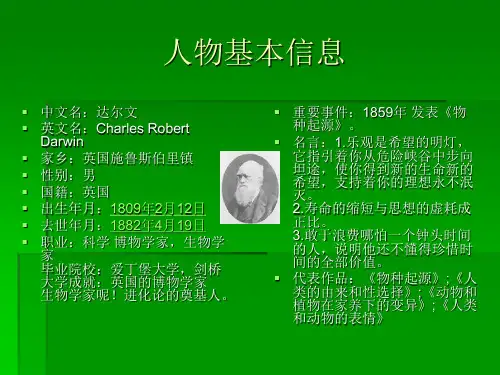
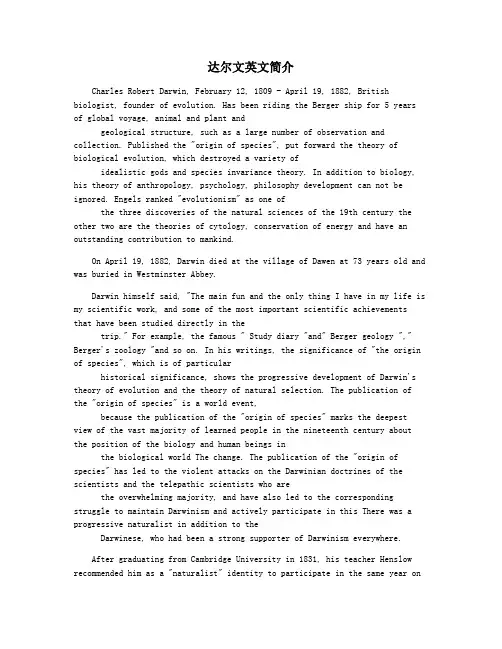
达尔文英文简介Charles Robert Darwin, February 12, 1809 - April 19, 1882, British biologist, founder of evolution. Has been riding the Berger ship for 5 years of global voyage, animal and plant andgeological structure, such as a large number of observation and collection. Published the "origin of species", put forward the theory of biological evolution, which destroyed a variety ofidealistic gods and species invariance theory. In addition to biology, his theory of anthropology, psychology, philosophy development can not be ignored. Engels ranked "evolutionism" as one ofthe three discoveries of the natural sciences of the 19th century the other two are the theories of cytology, conservation of energy and have an outstanding contribution to mankind.On April 19, 1882, Darwin died at the village of Dawen at 73 years old and was buried in Westminster Abbey.Darwin himself said, "The main fun and the only thing I have in my life is my scientific work, and some of the most important scientific achievementsthat have been studied directly in thetrip." For example, the famous " Study diary "and" Berger geology "," Berger's zoology "and so on. In his writings, the significance of "the origin of species", which is of particularhistorical significance, shows the progressive development of Darwin's theory of evolution and the theory of natural selection. The publication of the "origin of species" is a world event,because the publication of the "origin of species" marks the deepest view of the vast majority of learned people in the nineteenth century about the position of the biology and human beings inthe biological world The change. The publication of the "origin of species" has led to the violent attacks on the Darwinian doctrines of the scientists and the telepathic scientists who arethe overwhelming majority, and have also led to the corresponding struggle to maintain Darwinism and actively participate in this There was a progressive naturalist in addition to theDarwinese, who had been a strong supporter of Darwinism everywhere.After graduating from Cambridge University in 1831, his teacher Henslow recommended him as a "naturalist" identity to participate in the same year onDecember 27 British Navy "beagle" shiparound the world scientific expedition sailing. First in the South America on the east coast of Brazil, Argentina and other places and the west coast and adjacent islands on the inspection, andthen across the Pacific Ocean to Oceania, and then across the Indian Ocean to South Africa, and then around the Cape Atlantic by the Atlantic backto Brazil, and finally in October 1836 Dayback to England. When he traveled around the world with the Beagle, he carried a few birds, and in order to feed the birds, he planted a grass called grass. The cabin was dark and only thewindows were transmitted into the sun, and Darwin noticed that the grass seedlings were bent and grown in the direction of the window. But in the last few decades, Darwin was busy creating thetheory of evolution until his later years before proceeding with aseries of experimental studies on the issue of light, which was summed up inthe book "Plant Movement" published in 1880.Darwin is using the seeds of grass to do these experiments. When the seeds of the grass germinate, the germs are covered with a layer of coleoptile, and the germs are first ground and the germsare protected from damage when they are unearthed. Darwin found that the coleoptile was the key to light. If the seeds are planted in the dark, their coleoptiles will grow vertically upwards.If the sun shines from one side of the seedlings, the sheath is bent in the direction of the sun. If the tip of the sheath is cut off, or covered with opaque things, although the light can alsoshoot the sheath, the sheath is no longer bending to the light. If the coleoptile is covered with transparent things, the coleoptile is bent towardthe light, and even if the sheath is buriedwith opaque black sand, leaving only the tip, the buried sheath is still bent toward the light. Darwin speculates that a signal substance is secretedat the tip of the coleoptile and istransported down to the curved part, which causes the sheath to bend the sheath.The sailing changed the life of Darwin. After returning to England, he has been busy studying, determined to become a serious scientist to promote evolution. In 1838, he accidentally read T.Malthus's "theory of population", inspired by it, more certain that heis developing a very important idea: the world is not created within a week,the earth is older than the "Bible" Most ofthe animals and plants are changed, and still continue to change among the human, may be changed from a primitive animal, that is, Adam and Eve story is simply myth. Darwin realized that thesurvival struggle in the meaning of biological life, and realized that natural conditions is necessary for biological evolution of the "choice", the specific natural conditions are different,the choice is different, the choice of the results are not the same.However, he was extremely cautious about the results of his research. In 1842, he began to write an outline, after which it extended to several articles. In 1858, Darwin decided to submit theWallace article and his own part of the manuscript to the professional committee, in the light of the creative epiphany of the young naturalist R. Wallace. In 1859, "the origin of species," abook came out, the first edition of 1250 that day sold out. After Darwin spent twenty years collecting information to enrich his species through the natural selection of the theory ofevolution, and elaborate its consequences and significance.As a non-fist but creative man, Darwin avoided the controversy over his theory. Darwin wrote several books for scientists and psychologists when religious fanatical attack evolution wascontrary to the creation of the Bible. The book "The Origin and Sex of Mankind" reports evidence of the evolution of mankind from the lower form of life, the evidence of the similarity ofanimal and human mental processes, and the evidence of natural selection in the evolutionary process.On April 19, 1882, the great scientist died of illness, and his body was buried at the tomb of Newton to express his admiration for the scientist.感谢您的阅读,祝您生活愉快。
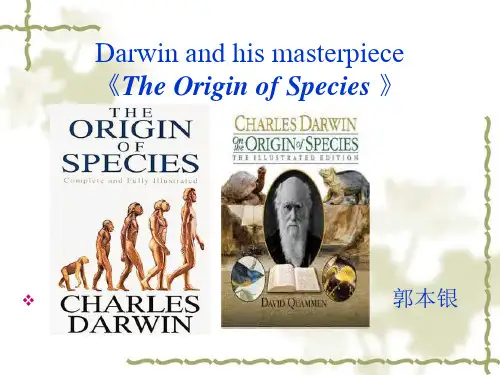
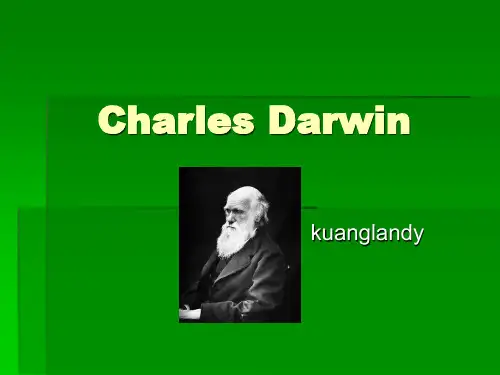
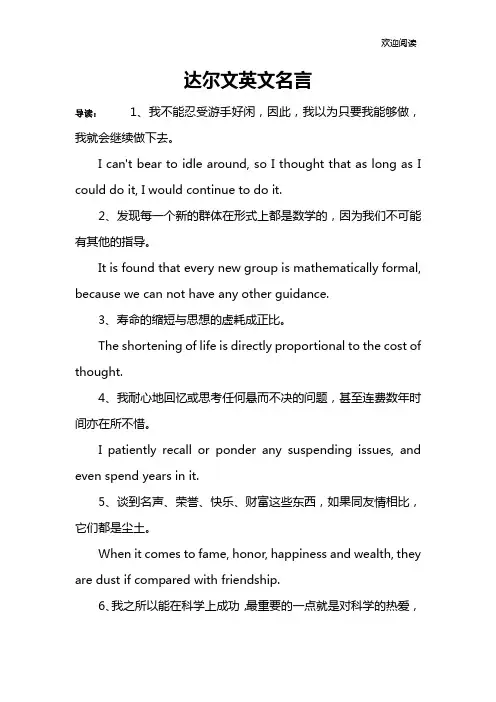
达尔文英文名言导读:1、我不能忍受游手好闲,因此,我以为只要我能够做,我就会继续做下去。
I can't bear to idle around, so I thought that as long as I could do it, I would continue to do it.2、发现每一个新的群体在形式上都是数学的,因为我们不可能有其他的指导。
It is found that every new group is mathematically formal, because we can not have any other guidance.3、寿命的缩短与思想的虚耗成正比。
The shortening of life is directly proportional to the cost of thought.4、我耐心地回忆或思考任何悬而不决的问题,甚至连费数年时间亦在所不惜。
I patiently recall or ponder any suspending issues, and even spend years in it.5、谈到名声、荣誉、快乐、财富这些东西,如果同友情相比,它们都是尘土。
When it comes to fame, honor, happiness and wealth, they are dust if compared with friendship.6、我之所以能在科学上成功,最重要的一点就是对科学的热爱,坚持长期探索。
The most important reason for my success in science is my love of science and my persistence in long-term exploration.7、敢于浪费自己生命当中一小时的人,尚未发现生命的价值。
The man who dares to waste one hour of his life has not discovered the value of life.8、讲到名望、荣誉、享乐、财富等,如果拿来和友谊的热情相比,这一切都不过是尘土而已。
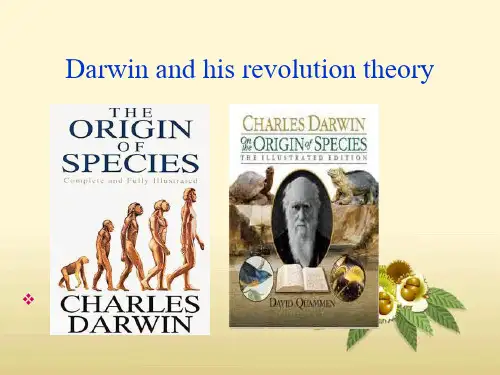
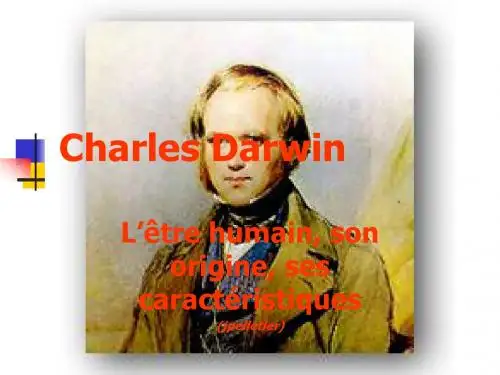
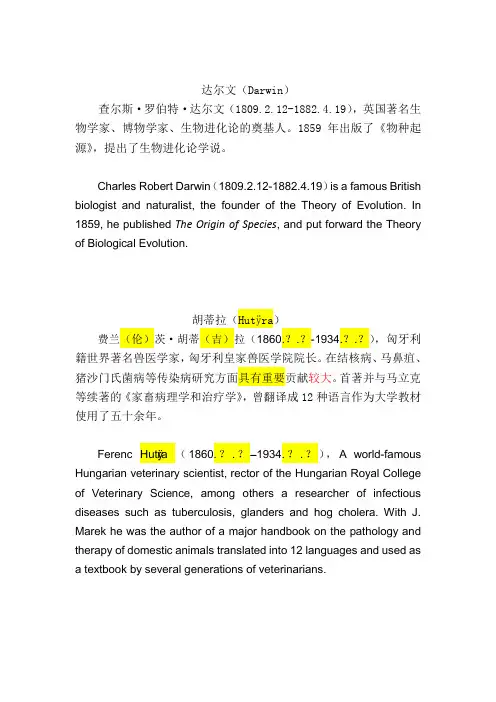
达尔文(Darwin)查尔斯·罗伯特·达尔文(1809.2.12-1882.4.19),英国著名生物学家、博物学家、生物进化论的奠基人。
1859年出版了《物种起源》,提出了生物进化论学说。
Charles Robert Darwin(1809.2.12-1882.4.19)is a famous British biologist and naturalist, the founder of the Theory of Evolution. In 1859, he published The Origin of Species, and put forward the Theory of Biological Evolution.胡蒂拉(Hutÿra)费兰(伦)茨·胡蒂(吉)拉(1860.?.?-1934.?.?),匈牙利籍世界著名兽医学家,匈牙利皇家兽医学院院长。
在结核病、马鼻疽、猪沙门氏菌病等传染病研究方面具有重要贡献较大。
首著并与马立克等续著的《家畜病理学和治疗学》,曾翻译成12种语言作为大学教材使用了五十余年。
Ferenc Hutÿr a(1860.?.?–1934.?.?),A world-famous Hungarian veterinary scientist, rector of the Hungarian Royal College of Veterinary Science, among others a researcher of infectious diseases such as tuberculosis, glanders and hog cholera. With J. Marek he was the author of a major handbook on the pathology and therapy of domestic animals translated into 12 languages and used as a textbook by several generations of veterinarians.。
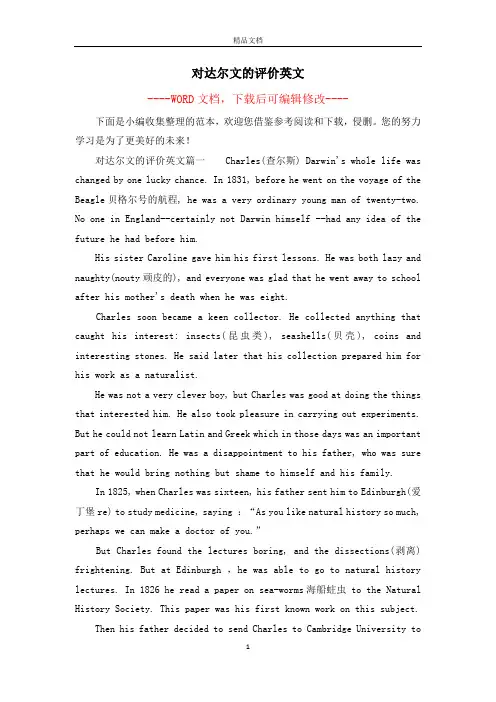
对达尔文的评价英文----WORD文档,下载后可编辑修改----下面是小编收集整理的范本,欢迎您借鉴参考阅读和下载,侵删。
您的努力学习是为了更美好的未来!对达尔文的评价英文篇一Charles(查尔斯) Darwin's whole life was changed by one lucky chance. In 1831, before he went on the voyage of the Beagle贝格尔号的航程, he was a very ordinary young man of twenty-two. No one in England--certainly not Darwin himself --had any idea of the future he had before him.His sister Caroline gave him his first lessons. He was both lazy and naughty(nouty顽皮的), and everyone was glad that he went away to school after his mother's death when he was eight.Charles soon became a keen collector. He collected anything that caught his interest: insects(昆虫类), seashells(贝壳), coins and interesting stones. He said later that his collection prepared him for his work as a naturalist.He was not a very clever boy, but Charles was good at doing the things that interested him. He also took pleasure in carrying out experiments. But he could not learn Latin and Greek which in those days was an important part of education. He was a disappointment to his father, who was sure that he would bring nothing but shame to himself and his family.In 1825, when Charles was sixteen, his father sent him to Edinburgh(爱丁堡re) to study medicine, saying :“As you like natural history so much, perhaps we can make a doctor of you.”But Charles found the lectures boring, and the dissections(剥离) frightening. But at Edinburgh ,he was able to go to natural history lectures. In 1826 he read a paper on sea-worms海船蛀虫 to the Natural History Society. This paper was his first known work on this subject.Then his father decided to send Charles to Cambridge University tostudy to become a priest.(牧师) With hard work, he did quite well. And, in the countryside around Cambridge, he was able to shoot, fish and collect insects.He seemed likely to become a country priest like hundreds of others, sharing his time between his work and his interest in natural history and country life. He had a deep faith in God and a lasting interest in religion. At this time he did not doubt that every word of the Bible (圣经)was true.Then a letter from Captain Robert Fitzroy菲茨罗伊 changed his life. Fitzroy was planning to make a voyage around the world on a ship called the Beagle. He wanted a naturalist to join the ship, and Darwin was recommended. That voyage was the start of Charles Darwin's great life work.In those days a great many people believed that every word written in the Bible was true. Darwin hoped that the plants and animals that they found in the course of their voyage would prove the truth of the Bible story of the great Flood.He began to observe everything. When they got to Rio de Janeiro里约热内卢 in South America, Charles was overcome with joy to see so many different creatures, so much life and color. His notebooks were full of detailed observations(观察值).Then they reached dry land at Punta Alta. There Darwin discovered his first fossils(fosoo化石). Why, he wondered, were there horse bones at Punta Alta, when there had been no horses in the New World until Cortez 科尔特斯 brought his from Spain(西班牙sban)They came to Tierra del Fuego火地岛 at the tip of South America. It was a strange place, with terrible storms. Its people grew no food, and they slept on the wet ground. Darwin observed their looks and habits.“How can people be so different, if all are descended(从一个祖先传下来的) from Adam and Eve in the Garden of Eden伊甸园?” Charles wondered.A trip into the mountains showed Darwin seashells at a height of 12,000 feet. Lower down were fossil trees.“So those trees once stood by the sea,” thought Darwin. “The sea came up and covered them. Then the sea-bed rose up...” To a man who had been taught that every word in the Bible was true, this was very puzzling(费解的).In Chile(智利, where Darwin saw earthquakes and volcanoes火山wo ka no), he began to see what must have happened. The centre of the earth, he decided, was very hot. The surface of the earth was thinner稀释剂 in some places. It was in these places that earthquakes and volcanoes developed.As the Beagle sailed around the world, Darwin began to wonder how life had developed on earth. He saw volcanic islands in the sea, and wondered how living things had got there.But people who believed every word of the Bible thought that God had made all creatures and Man. But, if that was true, why did some of the fossils look like “mistakes” which had failed to change and, for that reason, died out?On went Beagle, to Tahiti塔西提岛, New Zealand and Australia. There, Darwin saw coral 珊瑚(callroll)and coral islands for the first time. How had these islands come about? Soon, he had the answer. Coral was made up of the bodies of millions of tiny creatures, piled (paie )up堆积 over millions of years --a million years for each island. Darwin wrote it all down in his notebooks.After five years he was home. He was never again the healthy young man who climbed mountains and carried heavy bags of fossils for miles.He set to work, getting his collection in order. And, in 1839, he married his cousin, Emma Wedgwood. It was a happy marriage with ten children. He could be found working in his study, with a child beside him.His first great work The Zoology动物学 of the Beagle was well received, but he was slow to make public his ideas on the origins of life. He was certainly very worried about disagreeing with the accepted views of the Church.Happily, the naturalists at Cambridge persuaded说服(pesiwayde) Darwin that he must make his ideas public. So Darwin and Wallace华莱士, another naturalist who had the same opinions as Darwin, produced a paper together. A year later,Darwin's great book, On the Origin of Species by Means of Natural Selection appeared. It attracted a storm.People thought that Darwin was saying they were descended from monkeys. What a shameful idea! Although most scientists agreed that Darwin was right and that the story of Adam and Eve was merely a story, the Church was still so strong that Darwin never received any honors for his work.Many years later, he published his other great work, The Descent 下降 of Man. He gave a lecture at the Royal Institution习俗, when the whole audience stood up and clapped.His health grew worse, but still he worked. “When I have to give up observation, I shall die,” he said. He was still workin g on 17, April, 1882. He was dead two days later.对达尔文的评价英文篇二Darwin's theory of natural selection, the main content of four points: over-breeding, survival struggle (also known as competition for survival), genetic and variation, the survival of the fittest.This idea was first put forward by the French biologist Lamarck, in his "philosophy of animals" systematically expounded his theory of evolution (by the descendants of the descendants of Known as the "Lamarck doctrine"), proposed two rules: one is to use into the waste; one is acquired genetic. And that the two are both the causes of variation, but also to adapt to the formation process. He suggested that species can bechanged, the stability of species only relative significance. The reason for biological evolution is the direct impact of environmental conditions on living organisms. That the biological impact of the new environment, the habit of change, some of the frequently used organs developed, the infrequent use of organs gradually degraded. It is believed that the species can be gradually transformed into new species by continuously strengthening and perfecting the adaptable traits, and these acquired traits can be passed on to the offspring so that the organisms can evolve gradually. And that adaptation is the main process of biological evolution.For the first time, he explored the motive force of biological evolution from the aspect of the relationship between biology and environment, which provided a theoretical basis for Darwin's theory of evolution. However, due to the level of production and scientific level of constraints, Lamarck in explaining the causes of evolution, the environment for the direct role of organisms and inherited traits to offspring process is too simplistic, as a lack of scientific basis for a corollary, And mistakenly believe that the biological nature of the upward trend with the development, and the animal's will and desire to play a role in evolution. Darwin refuted his argument.Giraffe ancestors are short, because to eat high leaves, it desperately "long" neck, the results of the neck long, inherited to the next generation; deep-sea fish, because they do not see light, eye degradation, But also to the next generation .This doctrine has a fatal flaw, although the body changed, but the gene did not change, long and then high will not be passed on to the next generation.With Darwin's point of view, is the giraffe because of gene recessive and dominant problems, some high, some short, high survived, genes inherited to the next generation, more and more high, and short, because there is noFood and death, the gene is difficult to inherit, so the lastdisappearance of the deep-sea fish blind eyes, because the coincidence of the eye fish is not applicable to be eliminated, or slowly degenerate after birth.But Darwin's point of view is also limited by what, according to Darwin, the species of the world should begin with, such as giraffes, long necks, short but long adaptive environments , While the short neck is naturally eliminated, then that is when the giraffe should be a variety of it? The same explanation, why some birds color is white? Because other colors of birds are not suitable for the environment, it means that the birds before is colorful? In fact, Darwin was not aware of such a point of view - gene mutation. In nature, not only the environment in the selection of species, at the same time, the species itself is to adapt to the environment. When the organism itself is not suitable for the requirements of the environment when the gene mutation will be timely and health, this is the reason to promote the development of nature. Human analogy, human intelligence is not a natural result of the inevitable choice, according to Darwin's point of view, then the former people should have a high IQ also have low IQ, low IQ is not suitable for the environment and be eliminated, then this is clearly notConsistent with the development perspective. When the changes in the environment has not suitable for the survival of the ancient ape, when the body will occur mutations in many mutations in the environment to adapt to the mutation gene was retained, not suited to be eliminated. Sometimes the mutation rate of species is far beyond the speed of people's imagination, New York City has been found in the frozen food library with long plush mice, but around no such species. Indicating that the mice in order to eat the food library of food, due to long-term in low temperature environment foraging, the body produced a gene mutation.The general difference is that Darwin believed that the evolution ofspecies is not in accordance with the biological will, but the selection of nature.对达尔文的评价英文篇三Marx spoke highly of Darwin's doctrine, which he wrote in his letter to Engels: "Darwin's" origin of species "contains the natural scientific basis of our theory." Marx, after the publication of Capital, sent it to Darwin. "This book I must read, the nature of our work is different, but the purpose is one, are for the happiness of mankind," Darwin wrote to Marx in reply,1859 became the division of the history of science before and after the two "world" boundaries. The publication of "the origin of species" revolutionized biology, which, like Marxism on the stage of history, was of great significance and far-reaching influence. Darwin was far from the hustle and bustle of the great city and prepared a revolution in his quiet manor, which Marx himself prepared for in the world's clamor. The difference was that the levers were applied to the other. - Liebknecht Darwin's dominant idea of "the origin of species", that is, "natural selection", will be accepted as scientific truth-finding. It has all the great natural scientific truths have the characteristics of fuzzy for the clear, complex and simple, and in the old knowledge to add a lot of new things. Darwin was the greatest revolutionist of this century, and even of all the century's natural history. - British botanist WatsonI do not think the book "Origin of Species" is so good that it touches people who know nothing about the problem. As for Darwin's theory, I am prepared to support even through fire and water. - British naturalist HuxleySchultz, a historian of psychology, commented in 1981: "In Darwin's theory, the importance of the psychological factors of species evolution is obvious, and he often cites the human and animal consciousness of reaction.As a result of psychology and evolution , So psychology has toaccept this evolutionary point of view.。
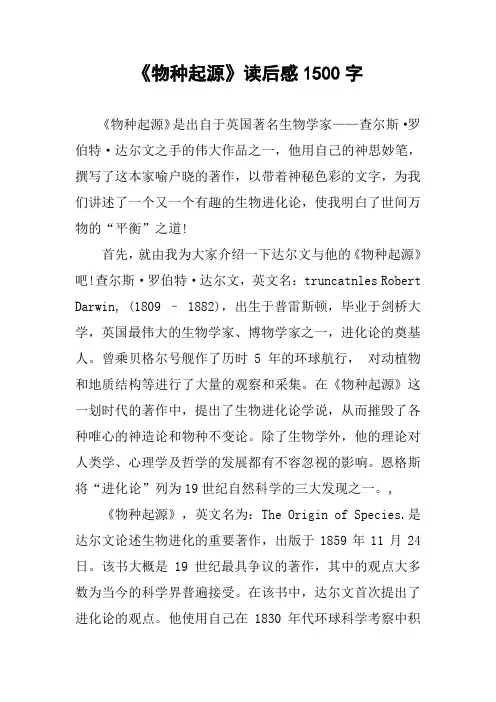
《物种起源》读后感1500字《物种起源》是出自于英国著名生物学家——查尔斯·罗伯特·达尔文之手的伟大作品之一,他用自己的神思妙笔,撰写了这本家喻户晓的著作,以带着神秘色彩的文字,为我们讲述了一个又一个有趣的生物进化论,使我明白了世间万物的“平衡”之道!首先,就由我为大家介绍一下达尔文与他的《物种起源》吧!查尔斯·罗伯特·达尔文,英文名:truncatnles Robert Darwin, (1809 – 1882),出生于普雷斯顿,毕业于剑桥大学,英国最伟大的生物学家、博物学家之一,进化论的奠基人。
曾乘贝格尔号舰作了历时5 年的环球航行,对动植物和地质结构等进行了大量的观察和采集。
在《物种起源》这一划时代的著作中,提出了生物进化论学说,从而摧毁了各种唯心的神造论和物种不变论。
除了生物学外,他的理论对人类学、心理学及哲学的发展都有不容忽视的影响。
恩格斯将“进化论”列为19世纪自然科学的三大发现之一。
, 《物种起源》,英文名为:The Origin of Species.是达尔文论述生物进化的重要著作,出版于1859年11月24日。
该书大概是19世纪最具争议的著作,其中的观点大多数为当今的科学界普遍接受。
在该书中,达尔文首次提出了进化论的观点。
他使用自己在1830年代环球科学考察中积累的资料,达尔文试图证明物种的演化是通过自然选择(天择)和人工选择(人择)的方式实现的。
在《物种起源》这本书里,达尔文用一句句令人信服的话,表现了他追求真理,想以全新的生物进化思想推翻"神创论"和"物种不变"理论的决心。
在书中,他有过着重的描写:生物胚胎间,人、鸡、猪、蛙、龟、鱼等的早期胚胎很相似,这表明它们十分可能有共同的祖先。
还有地理的分布:在大体相似的气候,如南美洲、非洲、澳洲都位于南半球,具有热带和温带的气候,可是生物类型彼此差别很大,或者是说在有些地区,如非洲(或南美洲)内部各地气候条件很大,但那里的生物类型却彼此相似!而生物可分成门、纲、目、科、属、种六个层次,每个层次都种类繁多,各式各样,可每一层之间,都有着或多,或少的类似、相同点!通过这本书,我不仅了解到了与科学有关的有趣内容,还让我有了许许多多的联想呢!当我读过《物种起源》后,第一个在脑海里产生的联想,那便是——世间万物的“平衡”。
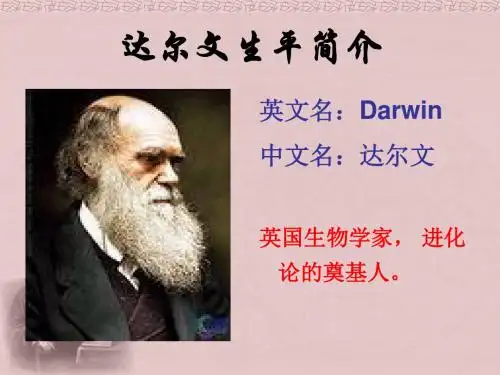
达尔文简介英文作文英文:Charles Darwin is a well-known English naturalist and biologist who is best known for his theory of evolution. He was born in 1809 in Shrewsbury, England. As a young man, he studied medicine at the University of Edinburgh, but he found it boring and left to pursue his passion for natural history.Darwin's most famous work is his book "On the Origin of Species," which he published in 1859. In this book, he proposed the theory of evolution by natural selection, which suggests that species change over time through a process of natural selection. This theory caused controversy at the time, but it has since become widely accepted in the scientific community.In addition to his work on evolution, Darwin also made important contributions to the study of geology, botany,and zoology. He was a prolific writer and published many books and articles throughout his career.One of the things I admire most about Darwin is his curiosity and his willingness to challenge conventional thinking. He was not afraid to question the prevailing ideas of his time and to explore new areas of knowledge. This is something that I try to emulate in my own life and work.中文:查尔斯·达尔文是一位著名的英国自然学家和生物学家,以他的进化论理论而闻名。